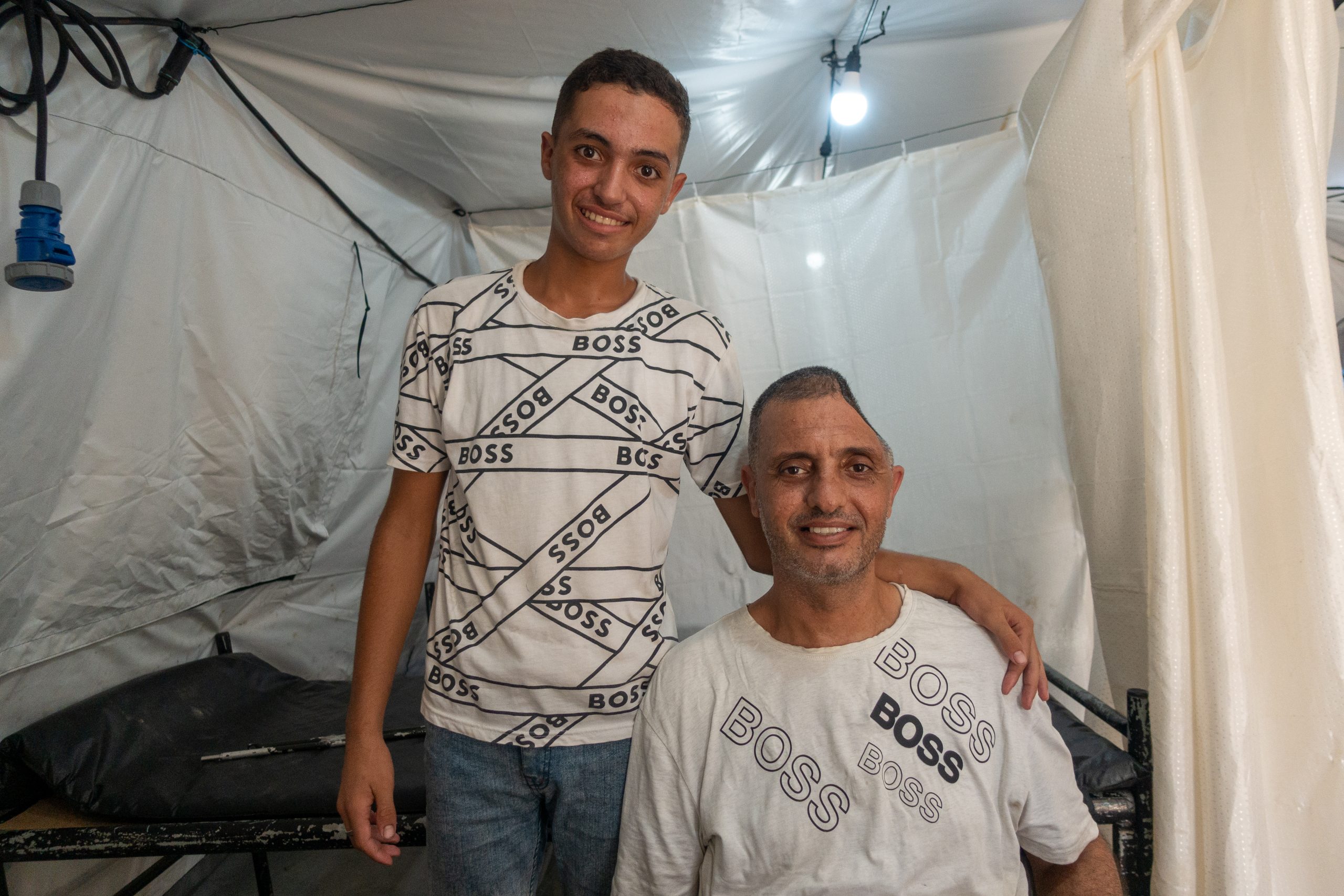
“My apartment building was hit four times, one of them directly above mine. The shelling is very intense, targeting residential areas with drones, guided bombs, cluster munitions, and phosphorus ammunition,” says 65-year-old Serhiy.
He came to the transit centre for internally displaced persons in the Kharkiv to receive humanitarian aid and fill out the necessary paperwork. He asks that his face not be exposed: “I tell my children that everything is more or less okay.”
Residents evacuated from communities on the frontline continue to arrive at transit centres in Kharkiv, with the number ever increasing. After receiving assistance from specialist teams, including UK-Med, they travel further from the conflict or remain in Kharkiv to find some peace. The city itself is only relatively safe, given its proximity to the frontline.

Serhiy fled Kupiansk, a small city located in the Kharkiv region, near the border with Russia, in early September. He’d lived in the city for 37 years. More than 95% of the buildings there have been destroyed or damaged, and shelling continues around the clock.
“When the gas and electricity were switched off, I stayed for another month. Then the shelling became very intense, and I realised that I had to leave,” says Serhiy. “There is virtually no communication with the city now; it is effectively cut off from the outside world. I don’t know what is happening there or what is happening to those who stayed.”
Despite the threat to their lives and severe destruction, residents of the city, the majority of whom are elderly, remain in Kupiansk. Shops and banks are closed; hospitals and clinics have been destroyed.
“I don’t go to the doctors often, but when I need to, it’s very important to have somewhere to go. In 2024, I was wounded in the head when I came under fire on the road. And it was the local medics who provided assistance and stitched me up,” Serhiy says.
Nadiya Pylypivna was also deprived of any possibility of receiving medical care at home. She had spent her entire life in the city of Kostiantynivka in the Donetsk region. She had worked at the local glass factory for 40 years.

“I have to visit doctors frequently…I have high blood pressure, and other health issues,” she says.
Nadiya had to flee her home in a hurry after a drone destroyed four apartments in her building, she miraculously survived. Together with her husband, they left everything behind, taking only documents, money, minimal clothing, and bedding from their home.
“When we left, there was nowhere left in the city to get medical help. Hospitals, clinics—everything was destroyed. And the city itself was also largely destroyed. There was nowhere to go. They destroyed one hospital, then another… And they keep bombing and bombing. One hospital was destroyed literally the day before we left,” Nadiya says.
Having escaped the danger, the couple ended up in the transit centre in Kharkiv. Nadiya openly talks about her life, but her voice trembles every time she mentions her home.
“Sometimes people are not ready to talk about their feelings right away because they are unwell and at a stage where they have not yet accepted what has happened to them. But after a few days, it’s the opposite: they desperately need someone to talk to. Support is extremely important right after they arrive,” says UK-Med psychologist Ksenia Gerasimova.
People who have been evacuated from the combat zone arrive at transit centres in shock, confusion, denial of reality, as well as with high blood pressure and the exacerbation of existing diseases says Inna Kutia, a doctor at the UK-Med mobile clinic.
“In transit centres, we mainly deal with the elderly who are the last to flee the settlements where they lived. These people have chronic diseases, they arrive in a difficult psychological condition, in acute stress. Our psychologists actively help them in the early stages”

UK-Med mobile medical units operate daily in frontline communities in the Zaporizhzhia and Kharkiv regions, where healthcare facilities are either closed or destroyed. According to the Ukrainian Ministry of Health, as of early August 2025, 2,108 medical facilities in the country had been damaged and another 311 completely destroyed. The most severe damage is in the frontline regions of Donetsk, Zaporizhzhia, Kharkiv, Luhansk, and Kherson.
UK-Med medical teams are a constant presence in the transit centres, helping those who have just left the combat zone, bringing different specialisms. Each team consists of a doctor, a psychologist, and a social worker to provide effective healthcare based on need.
“We provide first aid to stabilize blood pressure and sugar levels. We also provide related medications and painkillers, as many people suffer from chronic pain,” says Inna Kutia.
The UK-Med team examined Nadiya Pylypivna and gave her the necessary medication. They will last for a short period, until she registers with a new family doctor.

Even though she is now away from the frontline and in relative safety, she admits that she misses her home and wants to return as soon as possible.
“If I could go back home, I would first go to my apartment, if it still exists,” she says with a smile. “Everything, absolutely everything that is best in life relates to home. Yes, we had good housing here, but this is not home. Even the air is different here.” Nadia says with an appreciative smile.






